How Sukhibhava is helping women in urban slums move beyond sand, ash, and leaves to improve menstrual hygiene
Does your mind say ‘waste’ or ‘irrelevant’ when someone says sand, ash, plastic, newspaper, and rags? Research says that this would answer would resonate with only 12 percent of the 450 million women in India from across all economic layers. What’s waste and irrelevant to us is a vital resource for women rural, urban and semi-urban low income groups when they menstruate, either due to lack of awareness or economic factors.
Apart from the financial and educational aspect, there is an age-old cultural taboo surrounding the natural process of menstruation in the developing world, which hasn’t reached mainstream awareness yet.
Sukhibhava – the genesis
Dilip Pattubala pursued business management, during which he started a community service club organising activities like blood donation camps, slum development camps etc. Something clicked and he found his calling in the development sector.
Dilip had previously worked with The Akshaya Patra Foundation and HelpAge India. To dive deeper into the sector, Dilip pursued a Master’s in Social Welfare and Social Policy from Anglia Ruskin University, Cambridge, and worked with Red Cross Society in London. He moved back to Bengaluru to work with Pollinate Energy, an Australian startup working to eradicate energy poverty in Bengaluru’s slums. Dilip recalls,
One day I was working in the field when one of my Australian colleagues made an innocuous inquiry about the status of menstrual hygiene of women living in the urban slums. Quite taken back by the question because I had, like many men, never given this any thought, so I didn’t have an answer.
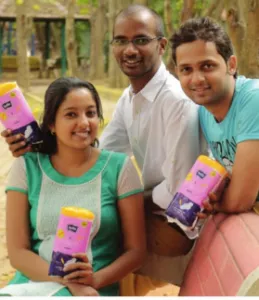
Curiosity led him to some desktop research and what he read was hard to comprehend. He adds, “It is one thing working in the urban slums but another thing when you read only 12 percent of the 450 million women in India have a basic idea of menstrual hygiene. I feared what would actually come out if we went looking.”
Dilip decided to rope in long-time friend, Sahana Bhat. Sahana holds a Master’s in Media Law and has worked with firms like Janagraha. The duo took a break from their respective commitments and decided to go looking for answers themselves. They conducted a survey with 250 underprivileged women to understand the status quo. The fear that was nesting in the duo’s minds turned out to be even more monstrous than what the reports suggested. Sahana says,
It was hard to digest when we found that even today 82 percent of the women in the sample were resorting to extremely unhygienic methods, like ash, sand, plastic, newspapers, rags, and even leaves!
Shocked with their findings and understanding the exigency for the need of a solution, Dilip and Suhana, both in their early twenties, founded Sukhibhava in 2013, with operations starting in June 2014.
Awareness and micro-entrepreneurs
Sukhibhava works with the women in the urban slums of Bengaluru, educating them about menstrual hygiene and providing them affordable menstrual hygiene products like sanitary pads through locally trained female micro-entrepreneurs.
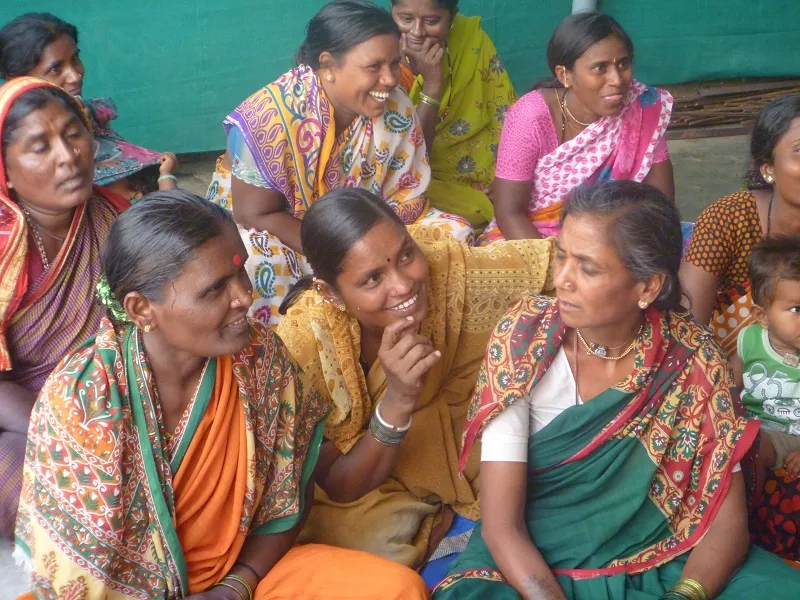
Drawing from learnings gained from the survey, the team conducted a four-month pilot, testing out 12 different products. The end of the pilot gave a conclusive answer to Sukhibhava about what to sell and how to sell it.
Here’s how they work:
- Awareness sessions are carried out through a 25-minute interactive video initially.
- The team has tied up with a sanitary pad manufacturer that subsidises sanitary packs. Instead of Rs 45 for a pack of eight pads, team Sukhibhava gets it for Rs 25. The team then identifies women living within these communities to become its micro-entrepreneurs. These women are trained to conduct awareness sessions and distribute the sanitary pads. Sukhibhava supports these micro-entrepreneurs for three months helping them build their networks and ensures they set up sustainable micro-businesses. A micro-entrepreneur earns Rs 5 for every pack sold.
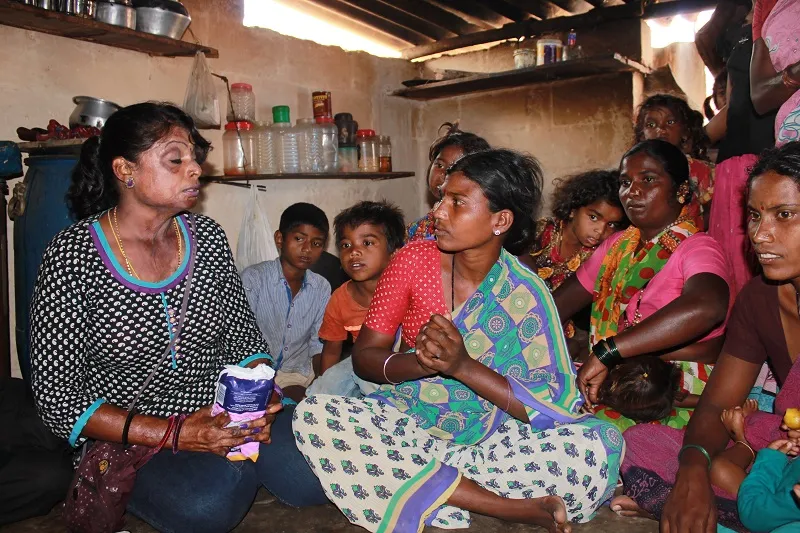
Sukhibhava is currently reaching over 7,200 women every month with affordable sanitary pads. It has educated over 11,800 women till date, and is working with 18 female micro-entrepreneurs in south Bengaluru.
Sukhibhava’s impact has been recognised by UN Habitat’s India Youth Fund, Acumen Fellowship, Deshpande Foundation, NASSCOM Foundation’s Social Innovation awards, Tata Social Enterprise Challenge and IIM-B’s Unsung Heroes.
Revenue model, collaborations, and bumps along the way
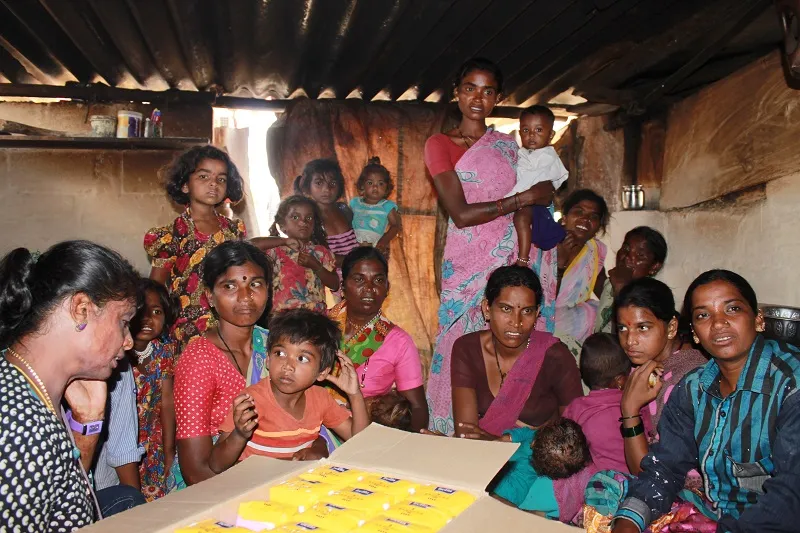
Dilip says that with miniscule profits it takes them a longer time to become sustainable since they’re selling sanitary pads at the cheapest possible price. “It takes about five to six months to make each chapter, which has about five to eight micro-entrepreneurs, sustainable,” he says.
Collaborations being a critical success factor for any social enterprise, Sahana says that they work with partner organisations in every community. She says, “Currently we have collaborative projects with MITU Foundation, Raza Education Society, PASAND, Saral Designs and Mantra4Change.”
On challenges, Dilip and Sahana say that working on a socially stigmatised subject was never easy.
Chock-o-block and yet charting new chapters
Dilip is an Acumen Fellow from the 2016 cohort and has his hands full with the Fellowship and Sukhibhava’s operations. Co-founder Sahana is also pursuing an MBA in Marketing.
Despite the duo’s almost impossible schedule, they’ve put Sukhibhava’s in the driver’s seat. Dilip tells us, “We see us working with one million women in next five years.”
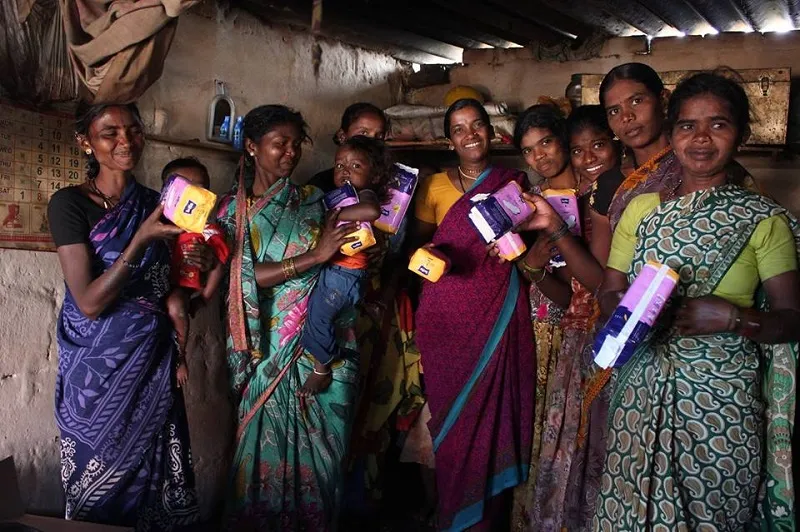
Sukhibhava will be fully operational in Bengaluru by August 2016. In the coming months, it intends to start working with rural regions of Hubli and Dharwad, and setting up operations in Pune. It hopes to start working in a third city by January 2017.
On a parting note, Dilip spills the beans on his dreams and next project,
Sukhibhava’s vision is my big dream, a day when every woman has the access and awareness to hygienic menstrual practices. But I don’t see that as an end, I want to work on similar issues which are often not talked about. Family planning will be our next project.







